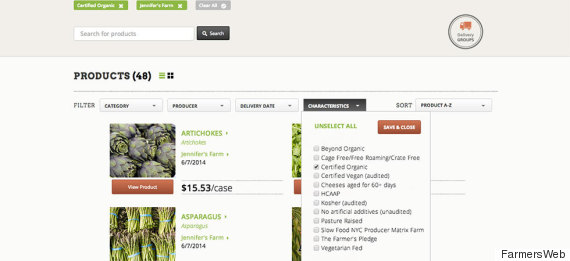
While it may be overused, the phrase "farm-to-table" is more than just a buzzword -- it represents an important cultural shift over the past 10 years in both the food industry and in the dining public's priorities. But as more farmers, restaurants and food purveyors try to source and serve food grown locally, infrastructure needs have grown.
Enter Farmers Web, an online portal that aims to connect farmers and producers with food buyers, making the farm-to-table process seamless. By removing the middle man, FarmersWeb says it enables farmers to cut down on costs, resulting in more local sourcing activity overall. Cutting out the middle man can also mean fresher food on plates. It's a win-win for all parties.
On the site, which launched in 2012, farmers create a free online profile whereby buyers browse their inventory. In addition to increased exposure and a direct line of communication, the website also offers subscription tools for marketing and managing orders, deliveries and financials. Farmers are responsible for delivering their products directly to buyers, or they can hire a logistics provider with the help of FarmersWeb.
Growers create their own FarmersWeb profiles to show off their products. (Screenshot/FarmersWeb)
From the buyer's perspective, FarmersWeb is like an online farmers market, allowing restaurants, hotels and schools to find new producers. Referring to the sprawling food distribution center in the Bronx, Brooklyn Edible likens FarmersWeb to "a virtual Hunt's Point." And Eataly's managing partner and chief operating officer Alex Saper told The New York Times that, "In a way, it’s like outsourcing the research I would otherwise do myself to find local suppliers.”
Jennifer Goggin, one of the FarmersWeb's three founders, points out that food distribution -- which includes managing a warehouse, trucks, labor, marketing and sales -- is a costly endeavor. In some cases, she told The Huffington Post, it's also redundant, because many farmers already have their own trucks and are already doing some delivery.
"What farms and buyers really need," Goggin said, "is a way to connect and transact with each other directly."
In creating FarmersWeb, Goggin also recognized an opportunity to free up time for food producers. From monitoring their produce and livestock to complying with federal and state regulations to running a business, farmers are busy, to say the least. FarmersWeb offers a streamlined way for them to manage inventory and expenses, no matter the size of the farm.
"Up until the past few years, it seemed like the business view of farming was either small-scale organic vegetable patches or huge agri-corporations. No company was developing tools for the huge number of mid-sized farms trying to run their farms as businesses," she said. "Technology can't help with everything, but it can at least cut down on the amount of hours they need to spend in an office organizing orders, invoices and paperwork, and that's how we're trying to help these farms become more efficient and scalable."
Restaurants and other buyers can search inventory, find sellers, and place orders.(Screenshot/FarmersWeb)
In just a few years, the model has already seen success; Goggin said several hundred businesses have signed up for the service. From initially handling only New York-area farms, the exchange is now available to any producer across the country. Two Wisconsin-based business, Wellspring Organic Farm and the wholesaler Koji's Produce, just recently signed on, she said.
FarmersWeb is helping farms and food businesses grow, too. When Cascun Farm in upstate New York started working with FarmersWeb, the operators had just purchased a first batch of 100 chicks with the hope of getting into the New York City wholesale market.
"After just a few years, they now process and sell about 18,000 birds a year using just the FarmersWeb software to manage all of their sales, which is pretty amazing," Goggin said.
Cascun Farms's owners told HuffPost that FarmersWeb was absolutely crucial for the growth of the business, helping the family-run farm easily set up meetings with restaurants that were four hours away in New York City. Once Cascun Farms started partnering with certain restaurants, they said, the activity spread by word-of-mouth on FarmersWeb, providing even more opportunities.
For Beth Linksey's Hudson Valley business Beth's Farm Kitchen, which sells products including jams and frozen local fruits, FarmersWeb works because it can continue to promote her "as a little business that can fill little niche needs for the hotels and restaurants," she told HuffPost.
"FarmersWeb is good to work with," she added, "and very responsive when we have new products to offer."
The site currently works with varied partners including meal delivery services like Munchery, corporate cafeterias including Facebook's, retail stores like Eataly, culinary schools including Natural Gourmet Institute, and restaurants like Amali, Cafe Luxembourg and The Meat Hook.
But it's still a relatively new company, and FarmersWeb staff hope to continually improve. Goggin says there's no typical day for her and her colleagues; one might involve designing and implementing new features for the site, while another could involve a road trip to a farm or restaurant that's interested in the platform. Lately, Goggin and her team have been working to set up logistics providers for farms that don't have the means to deliver goods themselves.
FarmersWeb has already updated its revenue model to encourage more farms to use the site. The original model charged a commission to sellers for sales that occurred through the site; the new model, called Pro Accounts, offers a flat monthly fee so that increased sales doesn't lead to increased expenses. For buyers and sellers, it's free to set up a profile, and producers can choose from the following plans: $40 a month or three percent of sales for 1-10 products a month, or $75 a month or three percent of sales for unlimited products.
Somewhat ironically, the farm-to-table movement is a return to how the food system used to operate -- and FarmersWeb makes that return feasible in the modern world.
Related
Before You Go











